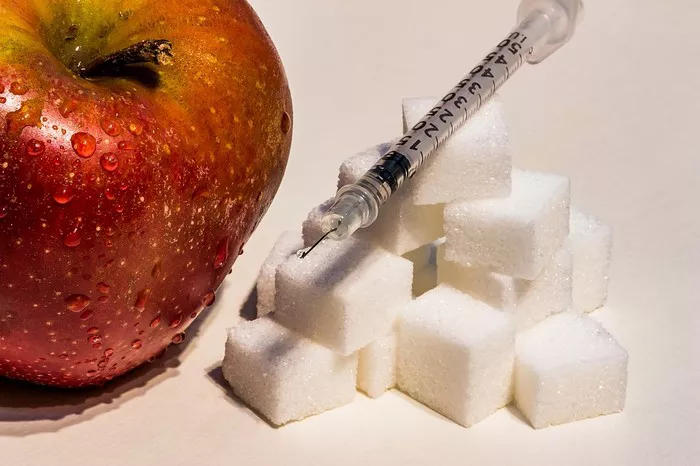Understanding Diabetes and Diet
Diabetes is a chronic condition characterized by high levels of glucose in the blood. This condition occurs either when the pancreas does not produce enough insulin (Type 1 diabetes) or when the body cannot effectively use the insulin it produces (Type 2 diabetes). Proper management of diabetes often requires a combination of medication, physical activity, and diet modification.
Diet plays a crucial role in managing diabetes. Foods that cause a rapid increase in blood sugar levels can be particularly harmful, making it essential for diabetics to monitor their carbohydrate intake and choose foods with a low glycemic index (GI). The GI is a ranking of carbohydrates on a scale from 0 to 100 according to the extent to which they raise blood sugar levels after eating. Foods with a low GI (55 or less) are preferable for diabetics as they cause a slower, more gradual increase in blood sugar levels.
Apples and Their Nutritional Profile
Apples are one of the most popular fruits worldwide, known for their crisp texture and sweet-tart flavor. They are also highly nutritious, providing a range of essential vitamins, minerals, and fiber. A medium-sized apple (about 182 grams) typically contains:
- Calories: 95
- Carbohydrates: 25 grams
- Fiber: 4 grams
- Vitamin C: 14% of the Recommended Daily Allowance (RDA)
- Potassium: 6% of the RDA
- Vitamin K: 5% of the RDA
Apples are also rich in antioxidants, including quercetin, catechin, and chlorogenic acid, which contribute to their health benefits. These antioxidants help combat oxidative stress and inflammation, which are linked to various chronic diseases, including diabetes.
Glycemic Index of Apples
The glycemic index of apples ranges between 28 and 44, depending on the variety and ripeness. This low GI value indicates that apples have a minimal impact on blood sugar levels compared to high-GI foods. The fiber content in apples, particularly soluble fiber like pectin, plays a significant role in moderating their glycemic impact. Fiber slows down the digestion and absorption of carbohydrates, leading to a more gradual rise in blood sugar levels.
Benefits of Apples for Diabetics
Fiber Content: The fiber in apples, especially the soluble fiber pectin, is beneficial for diabetics. Fiber slows down digestion and helps regulate blood sugar levels by preventing rapid spikes. Additionally, fiber promotes satiety, helping diabetics control their appetite and maintain a healthy weight.
Antioxidant Properties: Apples are rich in antioxidants, which help reduce oxidative stress and inflammation. Chronic inflammation and oxidative stress are common in diabetics and can lead to complications such as cardiovascular disease. The antioxidants in apples, such as quercetin and polyphenols, can help mitigate these risks.
Heart Health: Diabetics are at a higher risk of developing cardiovascular diseases. Apples have been shown to improve heart health by lowering blood pressure, reducing LDL cholesterol levels, and preventing the oxidation of LDL cholesterol. These effects are partly due to the fiber and antioxidant content of apples.
Weight Management: Maintaining a healthy weight is crucial for managing diabetes, especially Type 2 diabetes. Apples are low in calories and high in fiber, making them a satisfying and nutritious snack that can aid in weight management. Studies have shown that consuming whole fruits, including apples, is associated with lower body weight and a reduced risk of obesity.
Blood Sugar Regulation: The polyphenols in apples have been found to improve insulin sensitivity, which is beneficial for both Type 1 and Type 2 diabetics. Improved insulin sensitivity allows the body to use insulin more effectively, helping to regulate blood sugar levels.
Potential Concerns
While apples offer numerous benefits, there are some considerations for diabetics:
Carbohydrate Content: Although apples have a low glycemic index, they do contain carbohydrates, which can affect blood sugar levels. It is important for diabetics to monitor their carbohydrate intake and include apples as part of a balanced diet. Pairing apples with a source of protein or healthy fat can help further stabilize blood sugar levels.
Individual Responses: Each diabetic may respond differently to various foods. It is essential to monitor blood sugar levels after consuming apples to understand how they affect you personally. Keeping a food diary and working with a healthcare provider can help tailor dietary choices to individual needs.
Portion Control: Portion size matters. While a medium-sized apple is generally a healthy choice, consuming large quantities of fruit can lead to an excessive intake of carbohydrates and calories. Moderation is key.
How to Include Apples in a Diabetic Diet
Here are some practical tips for incorporating apples into a diabetic-friendly diet:
Choose Whole Apples: Whole apples, including the skin, provide the most fiber and nutrients. Avoid processed apple products like apple juice or applesauce, which can have added sugars and a higher glycemic index.
Pair with Protein or Fat: Eating apples with a source of protein or healthy fat can help stabilize blood sugar levels. For example, pair apple slices with peanut butter, cheese, or nuts.
Monitor Portions: Stick to a medium-sized apple and avoid consuming multiple apples at once. This helps manage carbohydrate intake and prevents blood sugar spikes.
Experiment with Varieties: Different apple varieties have slightly different nutritional profiles and flavors. Experiment with varieties like Granny Smith, which tend to have a lower glycemic index, or Fuji and Gala, which are sweeter but still nutritious.
Incorporate into Meals: Add apple slices to salads, oatmeal, or yogurt for added flavor and nutrition. Cooking apples can also bring out their natural sweetness without the need for added sugars.
Scientific Evidence and Studies
Numerous studies have investigated the impact of apple consumption on health, particularly in relation to diabetes management.
Apple Consumption and Diabetes Risk: A study published in the “British Medical Journal” in 2013 examined the association between fruit consumption and the risk of Type 2 diabetes. The study found that higher consumption of specific whole fruits, particularly blueberries, grapes, and apples, was significantly associated with a lower risk of Type 2 diabetes .
Fiber and Blood Sugar Control: Research has consistently shown that dietary fiber, especially soluble fiber, can improve glycemic control in diabetics. A review published in “Nutrients” in 2018 highlighted that soluble fiber helps lower postprandial (after-meal) blood glucose levels and improves overall glycemic control .
Antioxidants and Inflammation: The antioxidants in apples, such as quercetin, have been studied for their anti-inflammatory effects. A study published in the “Journal of Nutritional Biochemistry” in 2016 found that quercetin supplementation reduced markers of inflammation in individuals with metabolic syndrome, a condition often associated with diabetes .
Weight Management and Satiety: The role of apples in weight management has been supported by various studies. A study published in “Appetite” in 2009 found that consuming apple slices before a meal led to a 15% reduction in calorie intake during the meal, compared to those who did not eat apple slices .
Practical Considerations for Diabetics
Consultation with Healthcare Providers: Diabetics should consult with their healthcare providers, including dietitians and endocrinologists, to create a personalized diet plan that includes apples and other fruits in appropriate portions.
Blood Sugar Monitoring: Regularly monitor blood sugar levels to understand how apples and other foods affect your glucose levels. This helps in making informed dietary choices and adjustments as needed.
Balanced Diet: Incorporate apples as part of a balanced diet that includes a variety of fruits, vegetables, whole grains, lean proteins, and healthy fats. This ensures a comprehensive intake of nutrients essential for overall health.
Physical Activity: Combine a healthy diet with regular physical activity to manage diabetes effectively. Exercise helps improve insulin sensitivity and can aid in weight management.
Education and Awareness: Stay informed about the nutritional content and glycemic index of various foods. Education and awareness are key to making healthy dietary choices.
See also:What Diabetics Can and Cannot Eat
Conclusion
In conclusion, apples can be a healthy and nutritious addition to a diabetic diet when consumed in moderation and as part of a balanced meal plan. Their low glycemic index, high fiber content, and rich antioxidant profile offer several health benefits, including improved blood sugar control, reduced inflammation, and better heart health. However, it is important for diabetics to monitor their carbohydrate intake, choose whole apples over processed apple products, and pair them with protein or healthy fat to stabilize blood sugar levels. Consulting with healthcare providers and regularly monitoring blood sugar levels are essential steps in effectively managing diabetes and enjoying the health benefits of apples.
By making informed dietary choices and incorporating a variety of nutritious foods, diabetics can lead a healthy and balanced lifestyle while effectively managing their condition.
Related topics:
Why Is It Important For Elderly To Eat Healthy



























